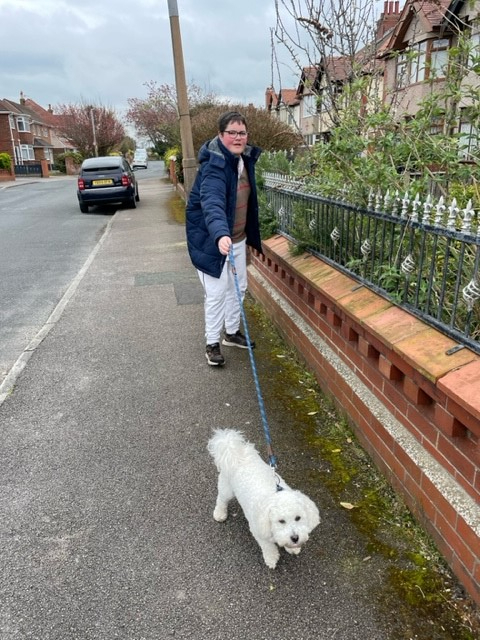Jacob, suffered with a fear of dogs, this presented itself as significant anxiety when he saw a dog in the community but also in fear of the therapy dog that goes into the school he attends. This was having a significant impact on his day-to-day living and his participation in community activities, he started to refuse to go out of his home on occasion as the fear increased.
However, with the help of Alan, one of our Children’s Learning Disability nurses, Jacob has managed to overcome his fear of dogs!
Alan explained:
“I wrote a comprehensive care plan detailing the intervention plan rationale and the stages of the intervention plan which would be delivered over a period of several months. I had meetings with Jacob’s school and his mum to go through the plan and build up their knowledge of the care plan and interventions in it. I liaised with a learning disability psychology for advice around anxiety guidance, using their expertise alongside my current knowledge to ensure the plan was the best plan for Jacob.”
The plan initially focussed on Jacob’s anxiety when seeing dogs when outside. Alan used an assessment tool called a ‘fear ladder scale’ to help him set a baseline for Jacob’s problem. The fear ladder scored Jacob’s anxiety at the time of commencement of the intervention and a score is given in different sceneries of Jacob’s fear of dogs. This helped Alan set a scene and this was reviewed as the intervention progressed.
Throughout the plan Alan continued to offer regular 1:1 session with Jacob and worked with his mum to explain the importance of positively reinforcing the successes of the intervention plan.
The sessions concentrated on building up coping strategies for Jacob and I created certificates for Jacob throughout to mark his progress. His school also acknowledged Jacob’s progress by sharing his story in school assemblies.
Alan continued:
“The improvement I have seen in Jacob has been significant. At the beginning of our work together Jacob was so impacted by his fear of dogs it was causing real issues and affecting his daily activities.
Jacob has managed to do things he has never been able to do before, such as stroking his Gran’s dog and taking the dog for a walk. Before our sessions Jacob would run off if he saw the school therapy dog, but he longer does this. In the community Jacob has enjoyed watching a band perform with several dogs in the audience, something that seemed impossible only a short while ago.”
Children’s Community Learning Disability nurses play a vital role in working directly with young people with a learning disability, and their families or carers, to promote health and wellbeing. The team provide specialist assessments to understand a young person’s needs and work together to support these, including individual or group-based approaches, liaise with local specialist schools, if required, as part of a holistic approach to support the young person and their family.
Jacob’s mum comments:
“Jacob prior to the therapies delivered was so terrified of dogs that it severely restricted our social activities and access to the community.
Since he started receiving the help he can now see a dog without his fight or flight response taking over and we are able to walk or ride his bike down the street. He is able to visit his grandmother’s again, albeit just outside her home. He has helped to walk his gran’s dog and can stroke him under controlled conditions.
Jacob is still very wary of dogs and we need as a family to always be aware of any present nearby but the majority of the time Jacob is able to cope with the presence of the dogs and Jacob will now call next doors small dog to the fence and talk to him.
Jacob is much more settled and a lot less fearful of going into school. He can be in the presence of the therapy dog and watch her and he understands more about dog behaviour.
I cannot praise Alan and his team enough for all their support and achievements enabling us to get ‘out and about’ a lot more than we used to.”
As a Trust we provide learning disability services that are suitable for all ages because we recognise that some people with learning disabilities require support for the whole of their lives. However, we also recognise that the needs of adults are different from the needs of children and young people. Therefore, there are two separate specialisms within the All Age Service.

